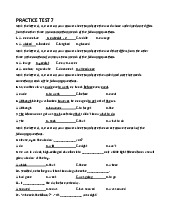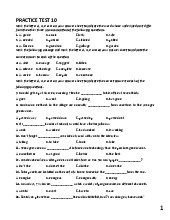








Preview text:
lOMoAR cPSD| 45438797 NGUYEN H. HUY 1 Passage
Fill in the blanks with a, an, the, or leave them blank where no article is needed.
(1) ___ government should prioritize (2) ___ healthcare, but (3) ___
decision to do so depends on (4) ___ various factors. (5) ___ effective
healthcare system is crucial for (6) ___ well-being of (7) ___ population.
However, (8) ___ balancing act is required when allocating (9) ___ limited resources.
(10) ___ proponents of increased healthcare funding argue that (11) ___
healthier population contributes to (12) ___ stronger economy. For
instance, (13) ___ United States has seen (14) ___ significant
improvements in (15) ___ productivity due to (16) ___ better healthcare.
On (17) ___ other hand, some argue that (18) ___ focusing on (19) ___
education and infrastructure could yield (20) ___ more long-term benefits.
In (21) ___ recent survey, (22) ___ majority of respondents expressed
dissatisfaction with (23) ___ current state of (24) ___ public healthcare.
They believe that (25) ___ increased investment is necessary to address
(26) ___ issues such as (27) ___ long waiting times and (28) ___ high
costs. For example, (29) ___ citizen from (30) ___ rural area might face
(31) ___ greater challenges in accessing (32) ___ medical services
compared to (33) ___ individual living in (34) ___ urban center.
(35) ___ government must consider (36) ___ broader implications of its
spending decisions. While (37) ___ healthcare is undoubtedly important,
(38) ___ investment in (39) ___ education can lead to (40) ___ more
educated workforce, which, in turn, can drive (41) ___ economic growth.
Furthermore, improving (42) ___ infrastructure can enhance (43) ___
quality of life for (44) ___ citizens and support (45) ___ overall economic development.
Ultimately, (46) ___ decision on how to allocate (47) ___ tax money
requires careful consideration of (48) ___ country’s specific needs and
priorities. It is (49) ___ complex task that involves weighing (50) ___
immediate benefits against (51) ___ long-term gains. By taking (52) ___
comprehensive approach, (53) ___ government can ensure that its citizens lOMoAR cPSD| 45438797 NGUYEN H. HUY 2
have access to both (54) ___ quality healthcare and other essential services. Answers and Explanations
The government should prioritize
Explanation: We re talking about the government in a specific sense,
typically referring to the national government. __ healthcare,
Explanation: Healthcare is used here in a general sense, so no article is needed. The decision to do so
Explanation: This refers to a specific decision that was previously mentioned or implied. __ various factors.
Explanation: Various factors are mentioned in general, so no article is needed.
An effective healthcare system
Explanation: "Effective healthcare system" is used as a singular countable noun, so "an" is appropriate. The well-being of
Explanation: "Well-being" is specific to the population mentioned, so "the" is used. The population.
Explanation: Refers to a specific population that was previously mentioned. A balancing act is required
Explanation: "Balancing act" is a singular countable noun, so "a" is
appropriate. __ limited resources.
Explanation: Limited resources are mentioned in general, so no article is needed. lOMoAR cPSD| 45438797 NGUYEN H. HUY 3
The proponents of increased healthcare funding
Explanation: Refers to a specific group of proponents already discussed or well-known.
A healthier population contributes to
Explanation: "Healthier population" is a singular countable noun, so "a" is
appropriate. A stronger economy.
Explanation: "Stronger economy" is a singular countable noun, so "a" is appropriate. The United States has seen
Explanation: "United States" is a proper noun referring to a specific
country, so "the" is used. __ significant improvements in
Explanation: "Significant improvements" are mentioned in general, so no
article is needed. __ productivity due to
Explanation: "Productivity" is an uncountable noun and is used in a general
sense here, so no article is needed. __ better healthcare.
Explanation: "Better healthcare" is mentioned in general, so no article is needed.
The other hand, some argue that
Explanation: The phrase "on the other hand" is an idiomatic expression that always uses "the." __ focusing on
Explanation: "Focusing" is a gerund here, and no article is needed.
__ education and infrastructure could yield
Explanation: Both "education" and "infrastructure" are uncountable nouns
used in a general sense here, so no article is needed. __ more long-term benefits. lOMoAR cPSD| 45438797 NGUYEN H. HUY 4
Explanation: "More long-term benefits" are mentioned in general, so no article is needed. A recent survey,
Explanation: "Recent survey" is a singular countable noun, so "a" is appropriate.
The majority of respondents expressed dissatisfaction
Explanation: "Majority of respondents" refers to a specific group within the survey, so "the" is used. The current state of
Explanation: "Current state" refers to a specific condition that has been identified, so "the" is used. __ public healthcare.
Explanation: "Public healthcare" is mentioned in general, so no article is needed.
__ increased investment is necessary
Explanation: "Increased investment" is mentioned in general, so no article is needed. __ issues such as
Explanation: "Issues" are mentioned in general, so no article is needed. __ long waiting times and
Explanation: "Long waiting times" are mentioned in general, so no article is needed. __ high costs.
Explanation: "High costs" are mentioned in general, so no article is needed. A citizen from
Explanation: "Citizen" is a singular countable noun, so "a" is appropriate. A rural area might face lOMoAR cPSD| 45438797 NGUYEN H. HUY 5
Explanation: "Rural area" is a singular countable noun, so "a" is appropriate.
__ greater challenges in accessing
Explanation: "Greater challenges" are mentioned in general, so no article is needed.
__ medical services compared to
Explanation: "Medical services" are mentioned in general, so no article is needed. An individual living in
Explanation: "Individual" is a singular countable noun, so "an" is appropriate. An urban center.
Explanation: "Urban center" is a singular countable noun, so "an" is appropriate. The government must consider
Explanation: Refers to a specific government previously mentioned, so "the" is used. The broader implications of
Explanation: "Broader implications" refers to specific implications in the context, so "the" is used.
__ healthcare is undoubtedly important,
Explanation: "Healthcare" is mentioned in general, so no article is needed. __ investment in
Explanation: "Investment" is mentioned in general, so no article is needed. __ education can lead to
Explanation: "Education" is mentioned in general, so no article is needed. A more educated workforce,
Explanation: "More educated workforce" is a singular countable noun
phrase, so "a" is appropriate. lOMoAR cPSD| 45438797 NGUYEN H. HUY 6 __ economic growth.
Explanation: "Economic growth" is mentioned in general, so no article is needed.
The infrastructure can enhance
Explanation: Refers to specific infrastructure being discussed, so "the" is used. The quality of life for
Explanation: "Quality of life" refers to a specific aspect of citizens’ lives, so "the" is used. __ citizens and support
Explanation: "Citizens" are mentioned in general, so no article is needed.
The overall economic development.
Explanation: Refers to specific economic development being discussed, so "the" is used.
The decision on how to allocate
Explanation: Refers to a specific decision previously mentioned or implied, so "the" is used.
__ tax money requires careful consideration
Explanation: "Tax money" is mentioned in general, so no article is needed.
The country’s specific needs and priorities.
Explanation: Refers to the specific country being discussed, so "the" is used. A complex task that involves
Explanation: "Complex task" is a singular countable noun phrase, so "a" is appropriate.
The immediate benefits against
Explanation: Refers to specific benefits being weighed, so "the" is used. The long-term gains. lOMoAR cPSD| 45438797 NGUYEN H. HUY 7
Explanation: Refers to specific gains being weighed, so "the" is used. A comprehensive approach,
Explanation: "Comprehensive approach" is a singular countable noun
phrase, so "a" is appropriate.
The government can ensure that its citizens
Explanation: Refers to the specific government being discussed, so "the" is used.
__ quality healthcare and other essential services.
Explanation: "Quality healthcare" and "other essential services" are
mentioned in general, so no article is needed. T m tắ t đp n
The government: Specific government referenced.
(No article) healthcare: General concept.
The decision: Specific decision referenced.
(No article) various factors: General reference.
An effective healthcare system: Singular, countable, and non-specific.
The well-being: Specific well-being referenced.
The population: Specific population referenced.
A balancing act: Singular, countable, and non-specific.
(No article) limited resources: General reference.
The proponents: Specific group referenced.
A healthier population: Singular, countable, and non-specific.
A stronger economy: Singular, countable, and non-specific.
The United States: Proper noun.
(No article) significant improvements: General reference. lOMoAR cPSD| 45438797 NGUYEN H. HUY 8
(No article) productivity: General reference.
(No article) better healthcare: General reference.
The other hand: Idiomatic expression.
(No article) focusing: Gerund.
(No article) education and infrastructure: General concepts.
(No article) more long-term benefits: General reference.
A recent survey: Singular, countable, and non-specific.
The majority of respondents: Specific group referenced.
The current state: Specific condition referenced.
(No article) public healthcare: General concept.
(No article) increased investment: General concept.
(No article) issues: General concept.
(No article) long waiting times: General reference.
(No article) high costs: General reference.
A citizen: Singular, countable, and non-specific.
A rural area: Singular, countable, and non-specific.
(No article) greater challenges: General concept.
(No article) medical services: General reference.
An individual: Singular, countable, and non-specific.
An urban center: Singular, countable, and non-specific.
The government: Specific government referenced.
The broader implications: Specific implications referenced.
(No article) healthcare: General concept.
(No article) investment: General concept.
(No article) education: General concept. lOMoAR cPSD| 45438797 NGUYEN H. HUY 9
A more educated workforce: Singular, countable, and non-specific. (No
article) economic growth: General concept.
The infrastructure: Specific infrastructure referenced.
The quality of life: Specific aspect referenced.
(No article) citizens: General reference.
The overall economic development: Specific development referenced.
The decision: Specific decision referenced.
(No article) tax money: General reference.
The country’s specific needs: Specific country referenced.
A complex task: Singular, countable, and non-specific.
The immediate benefits: Specific benefits referenced.
The long-term gains: Specific gains referenced.
A comprehensive approach: Singular, countable, and non-specific.
The government: Specific government referenced.
(No article) quality healthcare and other essential services: General concepts.




